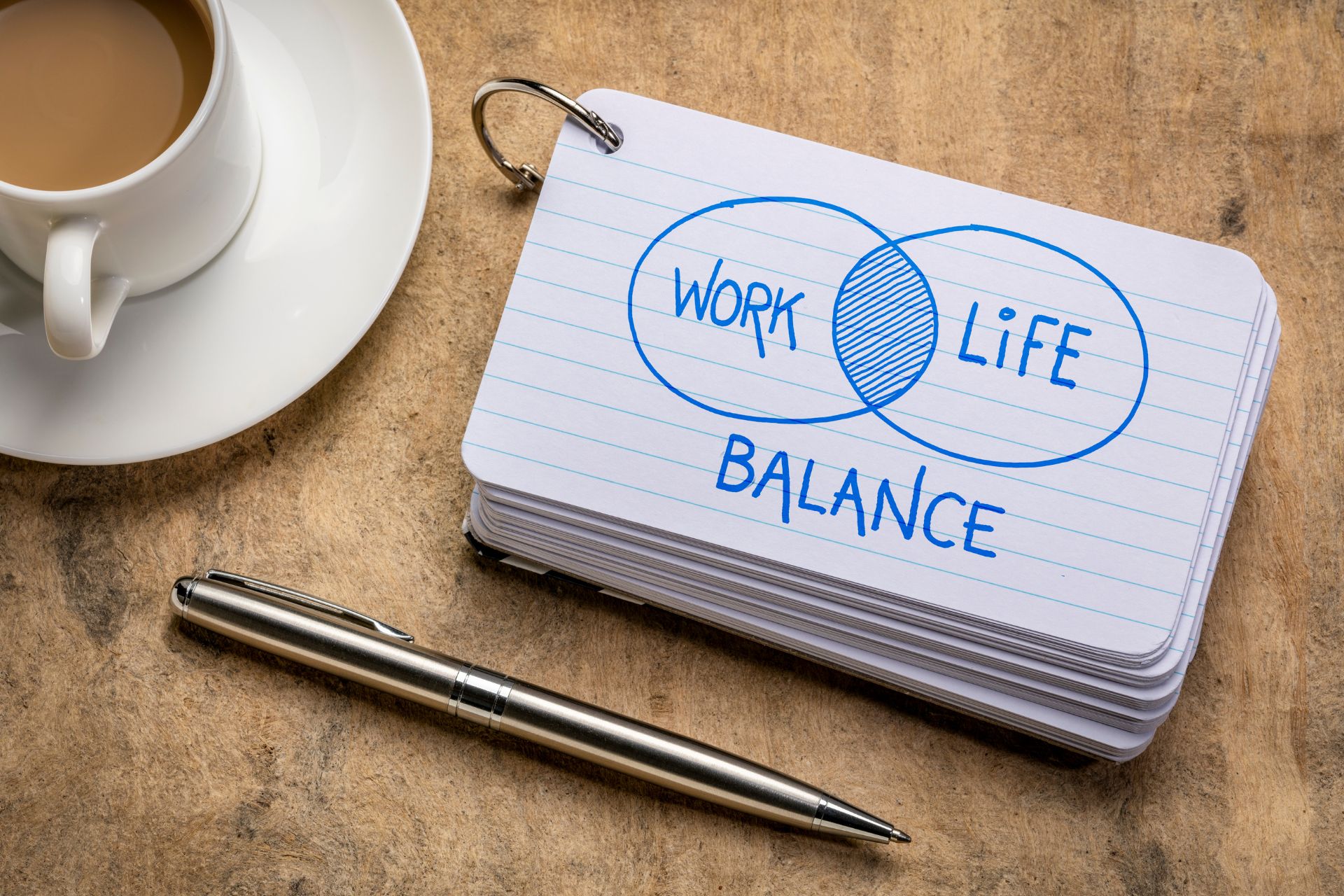Work-Life Balance Tips for Busy Professionals

In today’s fast-paced and demanding world, achieving a harmonious balance between work and personal life can seem like an elusive goal, especially for busy professionals. The constant pressure to excel at work while managing personal responsibilities can lead to stress, burnout, and a diminished quality of life.
However, striking a healthy work-life balance is not only possible but essential for long-term success and well-being.
This article offers practical tips to help you navigate the challenges of modern professional life and find a balance that enhances your productivity, happiness, and overall quality of life.
Set Clear Boundaries Between Work and Personal Life
Why It’s Important:
Clear boundaries between work and personal life prevent burnout and ensure you have time to relax and recharge.
In the digital age, the lines between work and personal life often blur, leading to a constant state of being “on the clock.” This lack of separation can quickly result in burnout, stress, and decreased productivity.
Setting clear boundaries is essential to maintaining your mental health and ensuring you have dedicated time to relax, recharge, and enjoy life outside of work. By establishing and respecting these boundaries, you can create a healthier, more sustainable work-life balance.
How to Do It:
– Define Work Hours: Stick to a schedule. Start and end work at the same time every day.
– Separate Spaces: If possible, create a dedicated workspace at home to keep work and relaxation areas distinct.
– Limit After-Hours Work: Avoid checking emails or taking work calls after hours.
Prioritize Your Tasks
Why It’s Important
In a world filled with endless to-do lists and constant demands, it’s easy to feel overwhelmed and stressed. Prioritizing your tasks is a crucial strategy to combat this chaos.
By focusing on what’s truly important, you can streamline your efforts, reduce stress, and enhance your overall efficiency.
Learning to prioritize effectively allows you to tackle high-impact tasks first, ensuring that your most critical responsibilities are addressed promptly and your productivity remains high.
How to Do It:
– Make a To-Do List: Write down your tasks and organize them by priority.
– Use the 80/20 Rule: Focus on the 20% of tasks that produce 80% of results.
– Delegate: If possible, delegate tasks to others to lighten your load.
Take Breaks
Why It’s Important:
In the pursuit of productivity, it’s tempting to power through your workday without stopping. However, this approach can quickly lead to burnout and decreased effectiveness.
Taking regular breaks is not a sign of laziness but a vital strategy for maintaining focus and productivity.
Brief pauses throughout the day help refresh your mind, reduce stress, and sustain your energy levels, ultimately making you more effective in your work and enhancing your overall well-being.
How to Do It:
– Follow the Pomodoro Technique: Work for 25 minutes, then take a 5-minute break. Repeat this cycle.
– Stretch and Move: Use breaks to stretch, walk, or do a quick exercise.
– Unplug: Step away from screens during breaks to rest your eyes and mind.
Manage Your Time Efficiently
Why It’s Important:
Time is a precious resource, especially for busy professionals juggling multiple responsibilities. Efficient time management is the key to maximizing productivity and achieving a better work-life balance.
By optimizing your use of time, you can complete tasks more quickly and effectively, freeing up valuable hours for personal activities and relaxation.
Learning to manage your time efficiently is not only essential for professional success but also critical for maintaining your well-being and enjoying a fulfilling life outside of work.
How to Do It:
– Plan Your Day: Start your day by planning your tasks and setting goals.
– Avoid Multitasking: Focus on one task at a time to improve quality and efficiency.
– Use Time-Management Tools: Utilize apps and tools like calendars and task managers to stay organized.
Learn to Say No
Why It’s Important:
In a culture that often glorifies busyness and overcommitment, learning to say no is a powerful skill that can transform your life.
Despite our best intentions, saying yes to every request or opportunity can quickly lead to overwhelm, spreading ourselves too thin and diluting our effectiveness.
By mastering the art of saying no to non-essential tasks and commitments, you can reclaim control over your time and energy, allowing you to focus on what truly matters most to you.
This simple yet profound act of setting boundaries empowers you to prioritize your goals, honor your values, and cultivate a more balanced and fulfilling life.
How to Do It:
– Evaluate Requests: Before agreeing to new tasks, assess if they align with your priorities.
– Be Polite but Firm: Decline politely but firmly, without feeling guilty.
– Set Limits: Communicate your boundaries clearly to colleagues and clients.
Take Care of Your Health
Why It’s Important:
In the hustle and bustle of everyday life, it’s easy to neglect our health in pursuit of professional success.
However, good health is not just a luxury; it’s the cornerstone of productivity, happiness, and overall well-being. When we prioritize our health, we’re better equipped to handle the demands of work and life with energy, focus, and resilience.
By making conscious choices to nurture our physical, mental, and emotional well-being, we lay a solid foundation for success in all areas of our lives.
How to Do It:
– Exercise Regularly: Aim for at least 30 minutes of physical activity most days.
– Eat Healthily: Choose nutritious foods that fuel your body and mind.
– Get Enough Sleep: Aim for 7-9 hours of sleep each night to ensure you’re well-rested.
Make Time for Hobbies and Interests
Why It’s Important:
In the whirlwind of work and responsibilities, it’s easy to neglect the activities that bring us joy and fulfillment outside of our professional lives. Yet, carving out time for hobbies and interests is not just a luxury—it’s a vital component of a balanced and fulfilling life.
Engaging in activities we love allows us to unwind, recharge, and reconnect with ourselves on a deeper level. Whether it’s painting, playing music, gardening, or hiking, our hobbies provide a sanctuary from the stresses of daily life and a source of renewed energy and inspiration..
How to Do It:
– Schedule Downtime: Allocate specific times for hobbies and leisure activities.
– Pursue Passions: Whether it’s reading, gardening, or playing a sport, make time for what you enjoy.
– Join Clubs or Groups: Connect with others who share your interests for social interaction and fun.
Stay Connected with Loved Ones
Why It’s Important:
Amidst the demands of our professional lives, it’s all too easy to let our personal relationships take a backseat.
Yet, staying connected with loved ones is not just a source of joy—it’s a fundamental human need. Strong relationships provide us with a sense of belonging, support, and happiness that is essential for our well-being.
Whether it’s spending quality time with family, catching up with friends, or nurturing romantic connections, maintaining these bonds enriches our lives in countless ways.
How to Do It:
– Prioritize Family Time: Schedule regular time with family and friends.
– Stay in Touch: Use technology to keep in touch with loved ones, even if they’re far away.
– Be Present: When spending time with others, be fully present and engaged.
Conclusion
Achieving work-life balance is a continuous process that requires effort and commitment. By setting boundaries, prioritizing tasks, taking breaks, managing time efficiently, saying no, taking care of your health, making time for hobbies, and staying connected with loved ones, you can create a balanced and fulfilling life. Remember, balance looks different for everyone, so find what works best for you and stick to it.
Implement these tips to enhance your work-life balance and enjoy a more satisfying professional and personal life.




